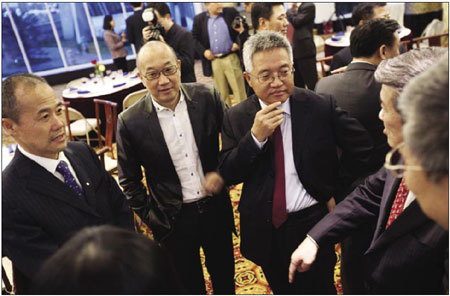Business
Local govts need to 'curb GDP craze'
Updated: 2011-04-07 11:03
By Chen Weihua (China Daily)
|
From left: Wang Shi from China Vanke, Feng Lun from Vantone, Zhang Weiying from Peking University and other business executives at a reception in New York. Provided to China Daily |
NEW YORK - While the central bank, the People's Bank of China, raised interest rates on Wednesday to stave off inflation, economists warned about the risky moves that local governments are taking to boost their GDP growth.
The reshuffling of local leaders as they take office is expected to take place in many Chinese cities in the coming year but experts said the turnover usually means a new wave of investments from them, said Lei Da, professor at the Institute of Research, Renmin University of China.
"Too many local governments regard themselves as corporations and they feel they are efficient and have done a good job in making investment and boosting economic growth," Lei told the Sino-US Macroeconomic Roundtable held on Wednesday at Columbia University.
He said it will not be easy to persuade these governments to stop their investment strategies.
"They are still obsessed with the GDP," he said, adding that such governments and an overly powerful State-owned enterprise (SOE) sector will pose problem to the next stage of China's economic transformation.
While acknowledging the needs to move from an economy driven by exports and investments to an economy driven more by domestic consumption, Lei said the shift will not be easy.
"It is entirely possible that for quite a while, investment will still be the driving force. But in the long run, it is only sustainable if the economy is primarily driven by domestic consumption," he said.
Lei pointed to wage increases and increases in government public spending as factors in boosting domestic consumption. But that process could be as long as five years.
"In the past, too much of the wealth distribution has gone to the government and too little has gone to the people, so private consumption has been curbed," Lei said.
Lei believes that inflation is not only tolerable but also necessary if China's GDP growth surpasses its consumer price index (CPI) by 3 percentage points, and if China's income growth surpasses CPI by 5 percentage points.
Jose Antonio Ocampo, professor in the School of International and Public Affairs at Columbia University, believes that China should not be too obsessed with keeping inflation low. He believes a 5 percent inflation is acceptable and unavoidable.
Christopher Cooper, managing partner of the Chinese Services Group at Deloitte LLP, pointed out SOEs as an inefficient sector in the use of capital.
Ken Davies, senior staff associate, Vale Columbia Center on Sustainable International Investment at Columbia University, suggests that China should further open up its service sectors to foreign investors so Chinese consumers can enjoy better services.
In Davies' view, China's service sector that serves the people is not up to the standards of China's manufacturing industry.
Cooper said while he likes to see the narrowing of the income gap to create more equality, the problem of millions of Chinese college graduates who cannot find jobs should be addressed more earnestly.
He said China needs more college graduates to go to work if the country wants to move up the wage chain.
China Daily
Specials

Share your China stories!
Foreign readers are invited to share your China stories.

Fill dad's shoes
Daughter and son are beginning to take over the family business of making shoes.

Have you any wool?
The new stars of Chinese animation are edging out old childhood icons like Mickey Mouse and Hello Kitty.
